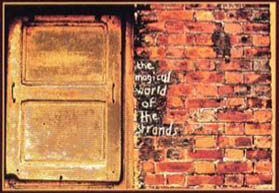Michael Head is a genius. Admittedly, not of the brand that self-proclaims it or that point to such fleeting indicators as sales for necessary reinforcement. Those types are ten-a-penny in The Information Age. No, Michael Head is a reluctant and hidden genius. The best kind. The kind that requires you to undertake a dedicated journey of self discovery, regardless of what you might ultimately discover, in order to reach such a conclusion.
I first became aware of Michael in 1982, a pivotal year in my life for a number of reasons. I left school; or to be more accurate, was invited to leave. I drifted from YOP scheme to demeaning job and back again. I lived an ordinary suburban working-class existence punctuated only by weekend gigs, hangovers and ridiculous dreams of playing for Rangers or winning the pools. I also met the person with whom I’d share my life. And I heard two records which – in different ways – changed my hitherto narrow-minded outlook on music. Both originated from the same city streets, and to these ears at any rate, had similar DNA; the same sense of hope and optimism amidst the early 80s societal rubble. One was Wah!’s ‘The Story of the Blues’. The other was the less-eulogised ‘Thank You’ by the Pale Fountains. I’ll return to its ultimate significance later, but suffice it to say, ‘Thank You’ stopped me in my tracks. It was a song out of nowhere, I’ll-fitting with the cultural context. It reminded me of songs my mother had loved. It was Glen Campbell and Bobbie Gentry; Jimmy Webb and Burt Bacharach. It sounded like a Eurovision Song but from a time when that was a good thing. A scheduled Top of the Pops appearance, which would have surely propelled them to the heights of the Radio 1 A-list was scuppered by strike action, and its moment was gone.
A couple of years passed, and nothing followed or at least nothing I was aware of. Was ‘Thank You’ simply a glorious one-off? A sylvan, pastoral summer breeze in the midst of the soulless solipsism of the New Romantics? And then the Pale Fountains resurfaced, supporting Echo & The Bunnymen. Two coruscating LPs emerged and the world that belonged to the Smiths was surely theirs for the inheriting. Michael wrote timeless songs that ached to be sung by the likes of Shirley Bassey or Dionne Warwick. But once again, it didn’t happen.
Ten years disappeared. A friend bought an LP called ‘Waterpistol’ and it circulated around our Glasgow office. My turn, and there’s something immediately familiar about that voice, those peerlessly melodic songs…that addictive mix of hope and yearning. Stories of common people; common people like me. And I’m back in love; totally fucking head over heels again. It’s a far better LP than ‘The Stone Roses’ in my opinion but, perhaps inevitably, the fates had conspired in ludicrous fashion and by the time it appeared, others less deserving had stolen the spotlight. De facto, it was largely lost. Lost genius.
More than any other, ‘The Magical World of The Strands’ was the record that prompted me to write. The night after I listened to it for the first time, I had a dream so vivid I wrote it down thinking it would make an interesting novel: The central protagonist – a recovering addict – searches for something very personal and important to him (we will never exactly find out what it is) which he has lost, or has had taken from him. His uncoordinated search forces him to confront the challenges and temptations he faces, the decisions he has made, the broken relationships, the places he somehow can’t leave … but also the joy and hope in things previously taken too much for granted; a necessary catharsis. The time sequence is uncertain and the story could be taking place over a year, rather than a day. There are four phases – morning, afternoon, evening and night – each with a different weather, reflecting the protagonist’s changing emotions. The story is about transformation and seeing things – his relationships, his city, his life – with a new clarity, but not always with the positivity he had assumed that would bring. He ultimately comes to the conclusion that, although he knows it will soon kill him, he preferred the anaesthetised life of an addict where he doesn’t have to deal with, or confront the pain he has caused others. One of these days, I’ll get it started.
Michael Head’s masterpiece LP is Pele in the 1970 World Cup Final; all nonchalant poise and effortless balance. Its Muhammad Ali dropping George Foreman in Zaire and knowing … just knowing that he didn’t need that final punch. Arrogantly brilliant. It’s one of the greatest LPs ever made. It’s a work of art as memorable and thought-provoking as Guernica. If you disagree with me, you’re simply wrong and my sorrowful heart goes out to you.
My new book is about a Scottish indie band set in the early 80s. When I asked my friend Bobby Bluebell if he might write a new song for my fictional band, the only brief I could give him was for it to feel like ‘Thank You’, the song that captured my imagination over thirty years ago and has never quite let go since.
Michael Head’s truly is a magical world. If you haven’t done so already, experience it for yourself. You won’t regret it.



